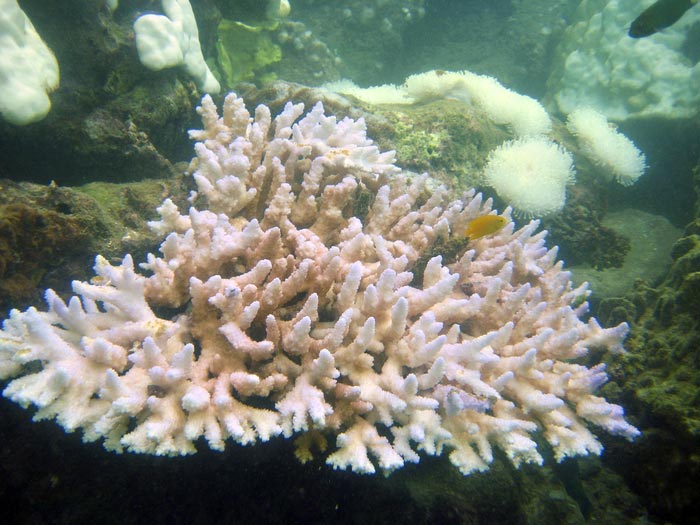A new method for predicting the response of ecosystems to marine heatwaves

Coral bleaching caused by marine heatwaves threatens not only the corals but also the species which rely on them for habitat. Photo: Dr Sylvain Agostini, Shimoda Marine Research Center, University of Tsukuba.
Credit: The University of Hong Kong
… developed by international collaboration.
Marine heatwaves, driven by climate change, are becoming more frequent and intense worldwide. Although we know that heatwaves kill marine organisms and have devastating effects on ecosystems, there is currently no way to predict these effects or help ecosystems adapt.
An international team of marine scientists from Hong Kong, Japan, and Canada, led by Dr Bayden D RUSSELL (Associate Director of the Swire Institute of Marine Science and Associate Professor from the School of Biological Sciences, the University of Hong Kong), including Dr Ben HARVEY (University of Tsukuba), Dr Katie MARSHALL and Professor Christopher HARLEY (University of British Columbia), have developed a new framework to allow us to not only understand the effects of marine heatwaves, but potentially predict their effects before they occur. This new method will allow researchers worldwide to identify the key biological traits of marine species in their region and predict how they are likely to be stressed by heatwaves. Most importantly, using this trait-based approach will allow managers and policy makers to identify the key species which are needed to support ecosystem function and develop strategies to help mitigate the damage caused by heatwaves.
Identifying the survivors: the future of marine ecosystems
Marine heatwaves are discrete heating events in which marine waters heat up to 6°C above normal and can last from days to months. Such high temperatures cause stress to animals and seaweeds, often killing them and in some cases driving range contractions to cooler waters. At the same time, tropical species will move into these colder waters as they warm and alter these ecosystems, sometimes irreversibly. The authors identified that key functional traits, such as heat tolerance, dispersal ability, feeding habits, and behavioural traits potentially affecting ecosystem characteristics, could be used to more accurately identify both how species will be affected by heatwaves and how this would change marine ecosystems.
According to the authors, identifying the functional traits of the resident faunal and floral assemblages is crucial for assessing the vulnerability of marine ecosystems to change and for designing effective management, conservation, and restoration plans. Until now, there has been no framework from which to predict the potential effect of marine heatwaves and prepare for their onset. This new approach allows the identification of key species which support complex ecosystems, such as seaweeds, corals, grazing fish or urchins, and to tailor management towards these species to enhance resistance to heatwaves, re-establishment after them, and ultimately support function of coastal ecosystems.
“Unlike the current approach that is used to project the impacts of marine heatwaves, the integration of trait-based approaches at multiple time scales allows us to use measurable and ecologically meaningful features of organisms, from individual physiological responses to biological interactions, to predict ecological patterns in space and time,” said Dr Bayden Russell. “We can now have a better understanding of how extreme events will drive patterns of geographic distribution, local abundance, and functional diversity of important species.”
“Using this approach will enable more targeted management of marine species to enhance community resilience under climate change,” added Dr Ben Harvey.
The findings were recently published in Trends in Ecology and Evolution (TREE).
The journal paper can be accessed from here:
https://www.sciencedirect.com/science/article/pii/S0169534721002500?dgcid=rss_sd_all
Images download and captions: https://www.scifac.hku.hk/press
For media enquiries, please contact Ms Casey To, External Relations Officer (Tel: (852)3917-4948; email: caseyto@hku.hk) and Ms Cindy Chan, Assistant Director of Communications, Faculty of Science, The University of Hong Kong (Tel: (852)3917-5286; email: cindycst@hku.hk).
Journal: Trends in Ecology & Evolution
DOI: 10.1016/j.tree.2021.09.003
Article Title: Predicting responses to marine heatwaves using functional traits
Article Publication Date: 27-Sep-2021
All latest news from the category: Ecology, The Environment and Conservation
This complex theme deals primarily with interactions between organisms and the environmental factors that impact them, but to a greater extent between individual inanimate environmental factors.
innovations-report offers informative reports and articles on topics such as climate protection, landscape conservation, ecological systems, wildlife and nature parks and ecosystem efficiency and balance.
Newest articles

Largest magnetic anisotropy of a molecule measured at BESSY II
At the Berlin synchrotron radiation source BESSY II, the largest magnetic anisotropy of a single molecule ever measured experimentally has been determined. The larger this anisotropy is, the better a…

Breaking boundaries: Researchers isolate quantum coherence in classical light systems
LSU quantum researchers uncover hidden quantum behaviors within classical light, which could make quantum technologies robust. Understanding the boundary between classical and quantum physics has long been a central question…

MRI-first strategy for prostate cancer detection proves to be safe
Active monitoring is a sufficiently safe option when prostate MRI findings are negative. There are several strategies for the early detection of prostate cancer. The first step is often a…



